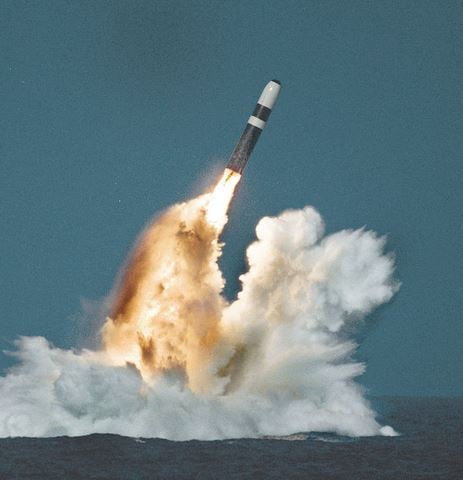The House of Commons voted 472 in favour and 117 against the renewal of the UK’s Trident nuclear weapons system. The vote means that the replacement of four submarines will go ahead, at an estimated cost of £31 billion.
Prime Minister Theresa May told MPs today that scrapping Trident would be grossly irresponsible – a move that would weaken Britain’s security and please our enemies more than anybody else.
If you criticize the Trident system, you are unwittingly defending this country’s enemies, she added.
 Test launch of a Trident D5 SLBM. (Image: Wikipedia)
Test launch of a Trident D5 SLBM. (Image: Wikipedia)
The Labour leader, Jeremy Corbyn, who as a backbencher voted against his party more than four hundred times, voted against the government and against Labour’s official policy, which is in favour of renewal.
Mr. Corbyn warned of the tragic consequences of using an indiscriminate weapon of mass destruction.
He faced strong criticism from his own backbenchers who reminded him of his party’s official policy.
Trident is currently being reviewed by the Labour Party, and its lawmakers have been given a free vote in the debate today.
Mrs. May looked exhausted on her fourth day as Prime Minister, which is probably the equivalent of spending a week outside Downing Street.
The @HouseofCommons has voted to renew our continuous at sea deterrent #trident pic.twitter.com/D8QkQ94L6r
— Ministry of Defence (@DefenceHQ) July 18, 2016
Labour split evident … again
Labour’s John Woodcock said:
“Whatever you may hear from the opposition frontbench, it is Labour party policy to maintain a nuclear deterrent.”
The Prime Minister thanked Mr. Woodcock and quoted from the Labour conference last year during which the commitment to Trident was made.
Sounding almost apologetic, Mr. Corbyn pointed out that Labour policy is “also to review our policy,” thus telling us all that any Labour policy is up for grabs, and its current declarations consist simply of a vague list of notions that can be updated daily.
Trident nuclear programme
The trident nuclear program or Trident nuclear deterrent covers the development, procurement and operation of the current generation of atomic weapons and the means to deliver them in the UK.
It is an operational system of four Vanguard-class submarine, all armed with Trident II D-5 ballistic missiles, which can deliver thermonuclear warheads from multiple independently-targetable re-entry vehicles.
At least one submarine is always on patrol. Each submarine is armed with up to eight missiles and forty warheads.
The debate today was regarding the replacement of the submarines.
Find out the facts about nuclear deterrence and the Successor submarine programme > https://t.co/99h2CMVQlG #tridenthttps://t.co/7cCQkYvT5X
— Ministry of Defence (@DefenceHQ) July 18, 2016
